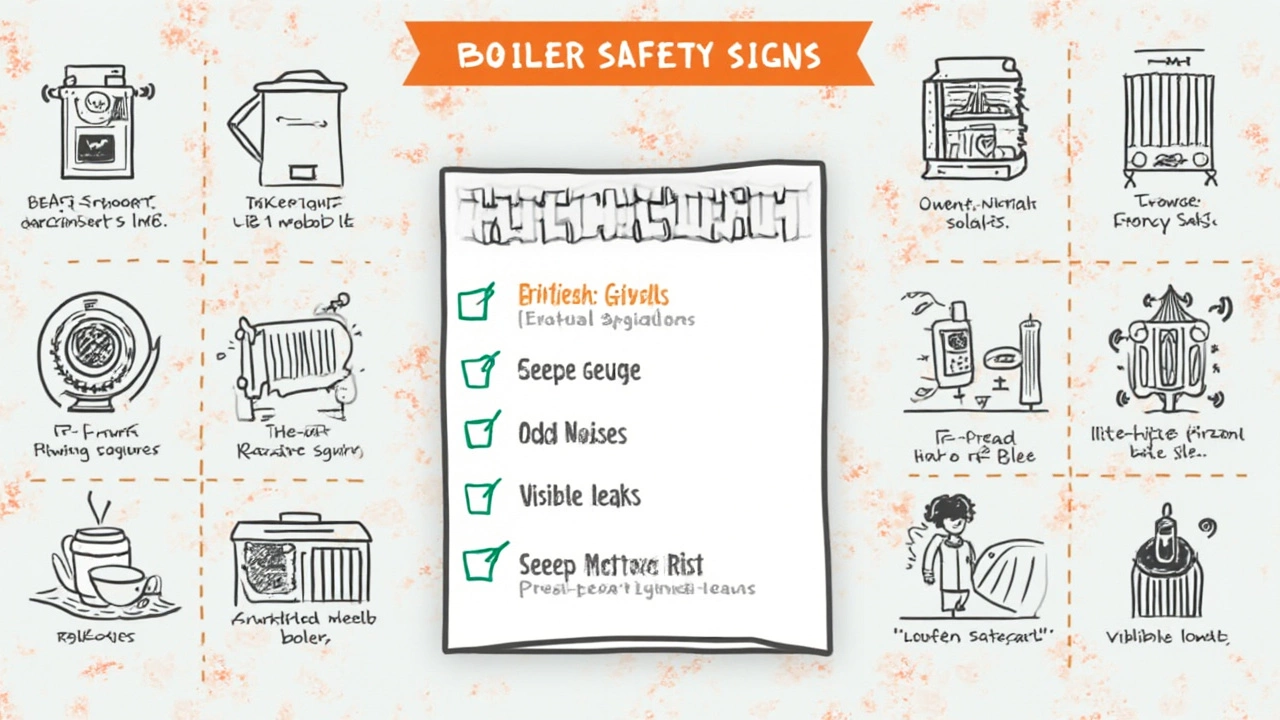Most folks see boiler servicing as another boring chore — until their house turns freezing or the hot water sputters out. But skipping a service can trigger more chaos than you might guess. Boilers aren't bulletproof, and all sorts of things can start going wrong once you let maintenance slide.
Take safety, for example. An unserviced boiler won't wave a red flag before leaking carbon monoxide or springing a gas leak. Even a tiny fault, left unchecked, can slowly build up into a real danger. That yearly check? It's less about a stamp in your logbook and more about catching hidden issues before they mess with your family's health.
On top of that, neglected boilers burn through energy like there's no tomorrow. Dust and dirt build up, making your system work harder and hike up your bills. Why pay more for the same amount of heat? Keeping the boiler clean isn't just for neat freaks—it's straight-up cash saved.
- Hidden Dangers Lurking Inside
- Efficiency Takes a Hit
- What Breaks (and When)
- Legal and Warranty Headaches
- Smart Habits for Care
Hidden Dangers Lurking Inside
A boiler might look tough on the outside, but inside it's a ticking mix of gas, heat, and water—all working under pressure. If you ignore servicing, you're basically rolling the dice with faults that stay out of sight until they cause trouble.
The most serious risk is carbon monoxide poisoning. When a boiler service gets skipped, flues and burners can get blocked by soot or debris. A faulty boiler may start leaking carbon monoxide, which you can't see, smell, or taste. According to the NHS, every year in the UK alone, carbon monoxide poisoning sends over 200 people to hospital, and it's usually traced back to dodgy gas appliances.
Leaks aren't just about gas—water leaks can do just as much damage. Corrosion inside the boiler and its pipes can grow unnoticed, eating away at key parts and causing puddles that rot floorboards or lead to mould. Then there’s pressure build-up: if safety valves or gauges stick, a boiler can start rattling, or worse, burst pipes and flood your home.
To give you an idea of the impact, here's a breakdown of the kinds of problems that pop up in neglected boilers:
| Danger | How it Happens | Problem Down the Line |
|---|---|---|
| Carbon monoxide leaks | Blocked or faulty flue, incomplete burning | Poisoning, headaches, fatal risk |
| Gas leaks | Worn out seals, cracked pipes | Explosion risk, fire hazard |
| Water leaks | Corrosion, split heat exchanger | Structural damage, damp issues |
| Pressure issues | Blocked valves, broken gauges | Boiler stops, bursts pipes |
If you spot stains, damp patches, or hear strange hissing sounds, those are early warning signs. Trust your nose too—sulfur smells aren't normal. The best way to dodge these disasters? Set up a regular service, ideally every year. It’s faster and way cheaper than sorting out an emergency repair or, worse, dealing with insurance claims after a big mess.
Efficiency Takes a Hit
If you miss your annual boiler service, your heating system starts losing its edge fast. Dirt, dust, and sludge collect inside the boiler over time, blocking key parts and making everything work harder. That extra strain means your boiler uses more gas just to keep up, so you end up with higher fuel bills for the same amount of heat.
Here’s the thing: even a thin layer of grime on the inside surfaces can cut energy efficiency big time. According to the Energy Saving Trust, just 1.6mm of scale can slash boiler efficiency by up to 12%. That doesn’t sound like a lot on paper, but across a winter of heating, that’s serious cash gone straight out the window.
When your boiler isn’t serviced, you can get uneven heating in different rooms too. One radiator boiling, another ice-cold — because the system can’t keep water flowing right. The *strong*boiler service check includes flushing out this kind of muck and testing if everything heats as it should.
Want to check if your boiler’s getting sluggish? If it’s taking longer to heat up, or if it’s cycling on and off more than usual, you’ve probably got a clog or a faulty part. Those are problems a pro could’ve spotted fast during a service — before your bills got scary high.
- Book your service before heating season so you’re not stuck when the cold hits.
- Keep an eye on your energy bills as an early warning that something’s off.
- Listen for weird noises like banging or bubbling; these signal drops in efficiency.
Simply put: regular servicing isn’t just for peace of mind. It keeps your boiler running smooth, your home warm, and your wallet happy.

What Breaks (and When)
Let’s be real: boilers break down at the worst moments. If you skip regular maintenance, the odds of a disaster shoot way up, especially when the cold weather hits and your heating is working overtime. According to data from the UK Energy Saving Trust, about 60% of boiler breakdowns happen in winter—right when you need it most.
The issues aren’t just about inconvenience. Here’s a look at the main parts that typically bite the dust if you forget about boiler service:
- Heat Exchanger: This piece gets clogged with sludge and limescale. If it overheats or blocks up, you’re looking at expensive repairs—which could sometimes cost as much as replacing the boiler.
- Pumps and Valves: When these seize up from lack of lubrication or wear out due to debris, the boiler starts making weird noises or stops working altogether. Sudden breakdowns are common here.
- Ignition and Sensors: Modern boilers are picky about safety. Sensors clogged with dust or faulty ignition can stop the entire system. Sometimes it’s just a niggling restart issue; other times, it’s a full shutdown.
- Expansion Vessel: Neglect leads to pressure problems and leaks. You end up topping up the boiler all the time, or worse, mopping up water from under your unit.
Service engineers see the same ‘repeat offenders’ each year. Like one Gas Safe engineer, Mark Hughes, put it:
“We call winter the ‘boiler breakdown season’ because so many failures are preventable with a simple annual check-up.”
If you want some hard numbers, here’s what the stats look like for homeowners who skip a service compared to those who keep up:
| Maintenance | Average Annual Repairs Cost (£) | Chance of Breakdown (%) |
|---|---|---|
| Serviced Yearly | ~90 | 10 |
| No Service | ~275 | 40 |
The difference isn’t just in your wallet. If you depend on hot water for showers or have young kids or older relatives at home, a cold house becomes more than just uncomfortable.
So, what should you look out for before things go south? Watch for these signs your boiler service is overdue:
- Boiler keeps resetting or switching off
- Loud banging, whistling, or gurgling sounds
- Pressure drops and leaks under the unit
- Heating taking noticeably longer to get warm
- Pilot light going out or showing a yellow flame
Catching these clues early can be the difference between a minor fix and a full-blown breakdown that leaves you shivering.
Legal and Warranty Headaches
Dodging your annual boiler service isn’t just risky for your home—it can also land you in hot water legally and financially. If you rent out your place, the law says you must get a registered engineer to check gas appliances (including the boiler) every year. Landlords who skip this can face hefty fines, and if something goes wrong, insurance usually won’t cover the damage.
If you’ve got a boiler warranty, the rules are just as clear. Every big brand—Worcester Bosch, Vaillant, Ideal, you name it—puts a yearly service in the fine print. Miss even one, and that “10-year warranty” could turn into “sorry, not our problem.”
Check this quick table to see what happens when you skip servicing:
| Scenario | Consequences |
|---|---|
| Landlord skips annual service | Court fines up to £6,000, risk of voided insurance |
| Homeowner ignores warranty terms | No free repairs on faulty boilers, even parts costing hundreds |
| Insurance claim after breakdown | Most insurers deny claim without service records |
Most people don’t realize insurance companies ask for proof of a boiler service before paying out. If you can’t provide a recent certificate, you’re on your own for any costs. That’s why keeping the paperwork might save you thousands down the line.
Here’s what to do every year:
- Book a Gas Safe registered engineer for your service
- Keep digital or paper records of each visit
- Set a reminder a month before your service is due, so you never accidentally miss it
So, even if your boiler seems fine, skipping the service can unravel your warranty, break the law, and burn a hole in your wallet—all at once.

Smart Habits for Care
You don't need to be a heating engineer to keep your boiler in good shape. A few smart habits will keep you out of trouble and help your boiler last longer. The big one? Book that annual boiler service with a Gas Safe registered pro. It really is the thing that keeps warranties valid and catches problems before they drain your wallet or turn dangerous. Most boiler manufacturers flat-out void your warranty if you skip this, so don’t wait until something breaks.
Between those annual services, pay attention to your boiler’s pressure gauge. Most home boilers work best between 1 and 2 bar. If the gauge drops below or jumps above that, you might have a leak or blockage. Another easy check: listen for weird noises. Banging, gurgling, and whistling aren’t normal. If your radiators feel colder at the top than the bottom, try bleeding them. It can make a big difference in how your system runs.
Want to avoid surprise breakdowns? Keep the area around your boiler clear. Stuffed cupboards and stacked boxes can block airflow and make your boiler less efficient. Also, check vents and flues for blockages or debris—birds' nests sound harmless until you realize they’re stopping carbon monoxide from escaping.
- Book a professional service every year.
- Check the pressure gauge once a month.
- Bleed your radiators at least once a year.
- Keep the boiler and vent areas tidy and free from obstructions.
- If you spot a leak or smell gas, turn off the boiler and call an expert, don’t try to fix it yourself.
A few minutes here and there really pays off. Keep these habits up, and your boiler should run safely and efficiently for years without any nasty surprises.


